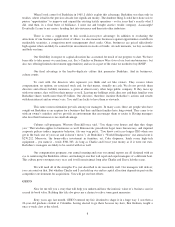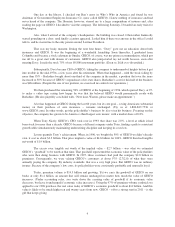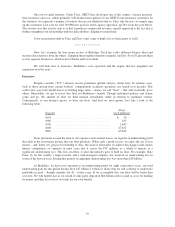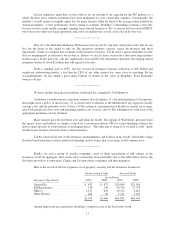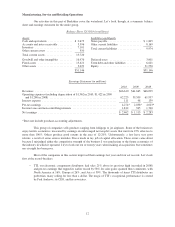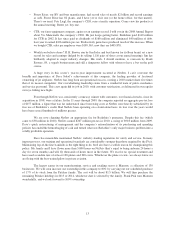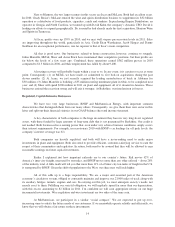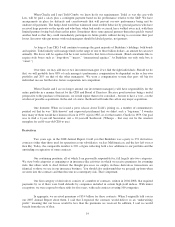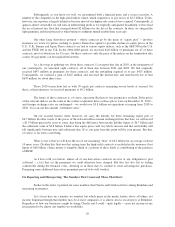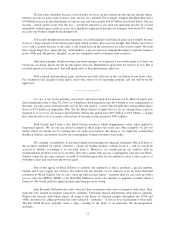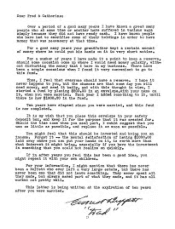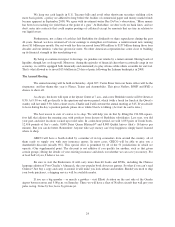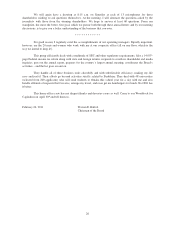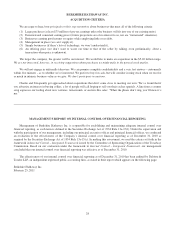Berkshire Hathaway 2010 Annual Report Download - page 20
Download and view the complete annual report
Please find page 20 of the 2010 Berkshire Hathaway annual report below. You can navigate through the pages in the report by either clicking on the pages listed below, or by using the keyword search tool below to find specific information within the annual report.All three of the companies redeeming must pay us a premium to do so – in aggregate about $1.4 billion –
but all of the redemptions are nevertheless unwelcome. After they occur, our earning power will be significantly
reduced. That’s the bad news.
There are two probable offsets. At yearend we held $38 billion of cash equivalents that have been
earning a pittance throughout 2010. At some point, however, better rates will return. They will add at least
$500 million – and perhaps much more – to our investment income. That sort of increase in money-market yields
is unlikely to come soon. It is appropriate, nevertheless, for us to include improved rates in an estimate of
“normal” earning power. Even before higher rates come about, furthermore, we could get lucky and find an
opportunity to use some of our cash hoard at decent returns. That day can’t come too soon for me: To update
Aesop, a girl in a convertible is worth five in the phone book.
In addition, dividends on our current common stock holdings will almost certainly increase. The largest
gain is likely to come at Wells Fargo. The Federal Reserve, our friend in respect to Goldman Sachs, has frozen
dividend levels at major banks, whether strong or weak, during the last two years. Wells Fargo, though
consistently prospering throughout the worst of the recession and currently enjoying enormous financial strength
and earning power, has therefore been forced to maintain an artificially low payout. (We don’t fault the Fed: For
various reasons, an across-the-board freeze made sense during the crisis and its immediate aftermath.)
At some point, probably soon, the Fed’s restrictions will cease. Wells Fargo can then reinstate the
rational dividend policy that its owners deserve. At that time, we would expect our annual dividends from just
this one security to increase by several hundreds of millions of dollars annually.
Other companies we hold are likely to increase their dividends as well. Coca-Cola paid us $88 million
in 1995, the year after we finished purchasing the stock. Every year since, Coke has increased its dividend. In
2011, we will almost certainly receive $376 million from Coke, up $24 million from last year. Within ten years, I
would expect that $376 million to double. By the end of that period, I wouldn’t be surprised to see our share of
Coke’s annual earnings exceed 100% of what we paid for the investment. Time is the friend of the wonderful
business.
Overall, I believe our “normal” investment income will at least equal what we realized in 2010, though
the redemptions I described will cut our take in 2011 and perhaps 2012 as well.
************
Last summer, Lou Simpson told me he wished to retire. Since Lou was a mere 74 – an age Charlie and
I regard as appropriate only for trainees at Berkshire – his call was a surprise.
Lou joined GEICO as its investment manager in 1979, and his service to that company has been
invaluable. In the 2004 Annual Report, I detailed his record with equities, and I have omitted updates only
because his performance made mine look bad. Who needs that?
Lou has never been one to advertise his talents. But I will: Simply put, Lou is one of the investment
greats. We will miss him.
************
Four years ago, I told you that we needed to add one or more younger investment managers to carry on
when Charlie, Lou and I weren’t around. At that time we had multiple outstanding candidates immediately
available for my CEO job (as we do now), but we did not have backup in the investment area.
It’s easy to identify many investment managers with great recent records. But past results, though
important, do not suffice when prospective performance is being judged. How the record has been achieved is
crucial, as is the manager’s understanding of – and sensitivity to – risk (which in no way should be measured by
beta, the choice of too many academics). In respect to the risk criterion, we were looking for someone with a
hard-to-evaluate skill: the ability to anticipate the effects of economic scenarios not previously observed. Finally,
we wanted someone who would regard working for Berkshire as far more than a job.
18


